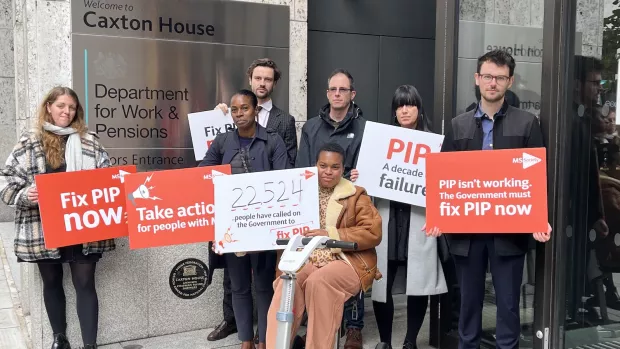
Funding for the future: why investing in MS now saves money later
Many of us were disappointed by today’s Budget, and its lack of investment for NHS neurological services. This feels like a missed opportunity.
A missed opportunity
Today, Chancellor Jeremy Hunt presented the Spring Budget, setting out the UK Government's spending plans.
Responding, Ceri Smith, our Head of Policy and Evidence said:
This budget is a hugely wasted opportunity. It fails to make any significant commitments to disabled people, including the 130,000 people living with MS, before the general election. MS can be debilitating, exhausting and unpredictable. Quick diagnosis, access to highly effective treatments, and support to manage symptoms can transform the long-term outlook for someone with the condition. But currently that support isn’t there for far too many people living with MS.
The government must commit to a comprehensive review of how we support people with neurological conditions. And find ways to ensure everyone with MS receive the timely and effective care they urgently need.
The value of action
Last month, we joined other neurological charities in the UK Parliament to discuss a recent report by the Economist Intelligence Unit, sponsored by Roche. The report highlights the long-term financial benefits of investing in best-practice MS treatment. It estimates that better access to treatments and therapies would save the UK economy over £500 million per year.
This isn't just theoretical. The report details real-world examples where proactive MS care has reduced healthcare costs, as well as wider costs to the UK economy.
Investment in neurological services and support for people with MS is a win-win. It creates better outcomes for people with MS and a more sustainable healthcare system.
However, neurological services are under significant strain. As the Chancellor announced his budget in parliament, more than 200,000 people are waiting for a vital neurology appointment. And thousands of people with MS are still not receiving treatments and therapies they’re eligible for.
MS is a condition that typically affects people at the peak of their working life. So when the government chooses not to invest in the right support and treatment for people with MS, this has a knock-on effect. They’re more likely to take sick days or be forced to give up work. In mild cases of MS, some treatments can reduce days absent from work by 42%.
So, what can be done?
A general election is expected this year. Ahead of this, we’re urging all political parties to commit to establish a Neuro Taskforce, to ensure neurology services are fit for the future.
The taskforce will also help ensure:
-
Neurology services are rapidly improved and fit-for-the-future
Assessing the UK’s current neuroscience workforce and setting out a workforce plan to catch up with our other counties – where neurology services are more easily available
- Faster Access to Treatment
Early intervention with Disease Modifying Therapies (DMTs) can significantly slow MS progression. Reducing delays in diagnosis and starting treatment can lead to better long-term outcomes for people with MS.
- Improved Rehabilitation
Providing access to physiotherapy, occupational therapy, and other rehabilitation services to people with MS can help them maintain independence. And reduce the need for long-term care.
By taking these steps, we can not only improve the lives of people with MS, but also save the country money.
We’re urging the government to reconsider its position and invest in a future where people with MS can live well and contribute fully to society.


